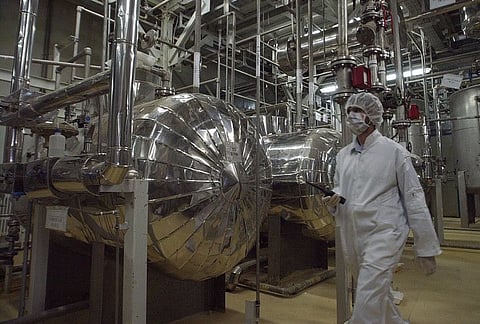Hitting Iran where it hurts
Until Tehran alters its conduct, it will face exclusion from international community

On Wednesday, the United States imposed a new round of economic sanctions on the regime in Iran, hitting at key sectors in its economy, imposing punitive measures on its iron, steel, aluminium and copper production and exports. It’s just the latest in a series of curbs ordered by President Donald Trump, aimed at making it very clear in the starkest of terms that there will be no leeway given to the regime in its attempt to use any means to acquire nuclear capability or to manufacture or assist the proliferation of ballistic missiles.
It must be abundantly clear to Iran that while other nations have attempted to ease international economic sanctions on the regime in return for a commitment to ensure its nuclear activities are purely for domestic use, Washington simply isn’t buying it. Why? Because Tehran’s attitude has not changed and it continues to disrupt Arab nations and interfere in the domestic affairs of countries like Lebanon, Syria, Iraq, Bahrain and Yemen. Iran’s leadership is focused on spreading its sectarian agenda, sowing the seeds of extremism and sedition, arming terrorists and training militias.
Iran should be under no illusion that these punitive measures from Washington will continue until such a time as it ends its malign influence across this region. With these new sanctions targeting its core industries, along with a previous round imposed on Iran’s oil exports, Washington and President Donald Trump could not be making it any clearer that they will continue to pursue a tough line against the regime in Tehran.
Make no mistake either, these targeted sanctions are working, with Iran being denied $10 billion (Dh36.7 billion) in oil revenues over the past 12 months — and Washington has recently ended exemptions for a dozen nations that were buying oil from Tehran. The reality is that things are going to get a lot tougher on the regime — and rightly so.
For those new measures to end, all the regime has to do is change its attitude, give up on its narrow sectarian agenda, behave live a normal member of the international community, cease and desist from cultivating dangerous liaisons with radicals and sectarian elements in the region from Bab Al Mandab to the Mediterranean. Simply put, it must be open to Washington and act like a good neighbour. Until Tehran alters its conduct, it shall continue to face the ostracism and exclusion from the international community.
Sign up for the Daily Briefing
Get the latest news and updates straight to your inbox



